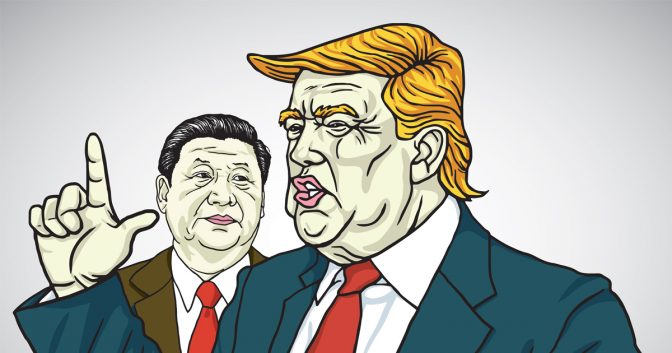Trump’s Callous Call for Death to Drug Dealers


Donald Trump makes a point as China’s Xi Jinping looks on.
“If we don’t get tough on the drug dealers, we’re wasting our time,” President Donald Trump told an audience in Manchester, N.H. on March 19. “And that toughness includes the death penalty… If we’re not going to get tough on the drug dealers who kill thousands of people and destroy so many peoples’ lives, we are just doing the wrong thing… Toughness is the thing they most fear.»
Aside from the fact that the death penalty may be unconstitutional—the Supreme Court in 2008, in Kennedy v. Louisiana, ruled it was cruel and unusual punishment when “the crime did not result, and was not intended to result in death of the victim”—the idea simply rehashes the futile tough-on-drugs policies promulgated by presidents for the last 50 years.
«Executing people for selling drugs is absolutely ridiculous,» Law Enforcement Action Partnership director Neill Franklin, a former Maryland state trooper, told reporters. «Education and treatment, with a mental health focus, are the only things that have proven to work at reducing addiction and overdose deaths. I know from experience that most drug dealers are dealing with addiction themselves. Just how many folks are we willing to murder?»
In a followup memo to federal prosecutors on March 20, Attorney General Jeff Sessions wrote: «This should also include the pursuit of capital punishment in appropriate cases,» such as «dealing in extremely large quantities of drugs» and «the use of a firearm resulting in death during a drug trafficking crime.»
Trump is far from the first president to think that all he has to do to get rid of drug abuse is to just kick some ass. In 1970, facing rising street crime and heroin addiction, along with a cultural opposition fed by marijuana, President Richard Nixon declared “war on drugs.” He greatly increased the federal government’s role in drug-law enforcement and enacted strict new laws. In 1973, New York State pioneered mandatory-minimum sentences for drug offenses, with the sale of an ounce of cocaine or heroin getting 15 years to life.
What were the results? By the late ’70s, there were more places to buy a bag of heroin than to get a cup of coffee in many poorer city neighborhoods. Cocaine had become widespread and marijuana smuggling was a multimillion-dollar and increasingly violent business.
Presidents Ronald Reagan and George H.W. Bush responded by escalating the war: militarizing drug enforcement, intensifying federal mandatory minimums and expanding forfeiture and police power to search people. While overall drug use declined somewhat, crack exploded. As rival dealers battled for control of the new business in the late ’80s and early ’90s, New York City, Los Angeles and Chicago experienced a record numbers of murders.
Trump is far from the first president to think that all he has to do to get rid of drug abuse is to just kick some ass.
The recent increase in heroin use was also stimulated by a crackdown. Sales of prescription opioids “nearly quadrupled” from 1990 to 2014, according to federal Centers for Disease Control figures. This happened because doctors paid more attention to patients’ pain and aggressive marketing by drug companies like OxyContin manufacturer Purdue Pharma. But after states seeking to close “pill mills” tightened their prescription rules in the early ’10s, heroin filled the vacuum. Cut with the intensely potent opioid fentanyl, however, it was much more likely to cause an overdose.
Trump’s call for the death penalty for drug dealers is more pose and attitude than a realistic solution. It reflects his admiration for the thuggish Philippines President Rodrigo Duterte, who’s overseen the slaughter of 20,000 alleged drug users by police and vigilantes since he took office in 2016, according to Philippine Senator Antonio Trillanes’ interpretation of government claims. Trump told Duterte last April that he was doing an “unbelievable job on the drug problem.” He’s also praised China and Singapore for having the death penalty for drug traffickers, saying their leaders told him it’s the reason they have “no problem” with drugs. (Singapore mandates the death penalty for more than 500 grams of cannabis.)
Finally, Trump’s strongman statements ignore why people become addicted to opioids in the first place. Rather than a traditional inner city drug problem, the opioids crisis has hit Appalachia, rural Ohio and northern New England where communities have been obliterated by deindustrialization and the erosion of the American middle class. People already know heroin is illegal and potentially lethal, but you can’t just bark and scare them away from it when the high temporarily quells boredom, personal demons and despair.
Related Articles
Trump Shows Support for Duterte’s War on Drugs
Legal Advice for Life During the Rule of Sessions
If you enjoyed this Freedom Leaf article, subscribe to the magazine today!

